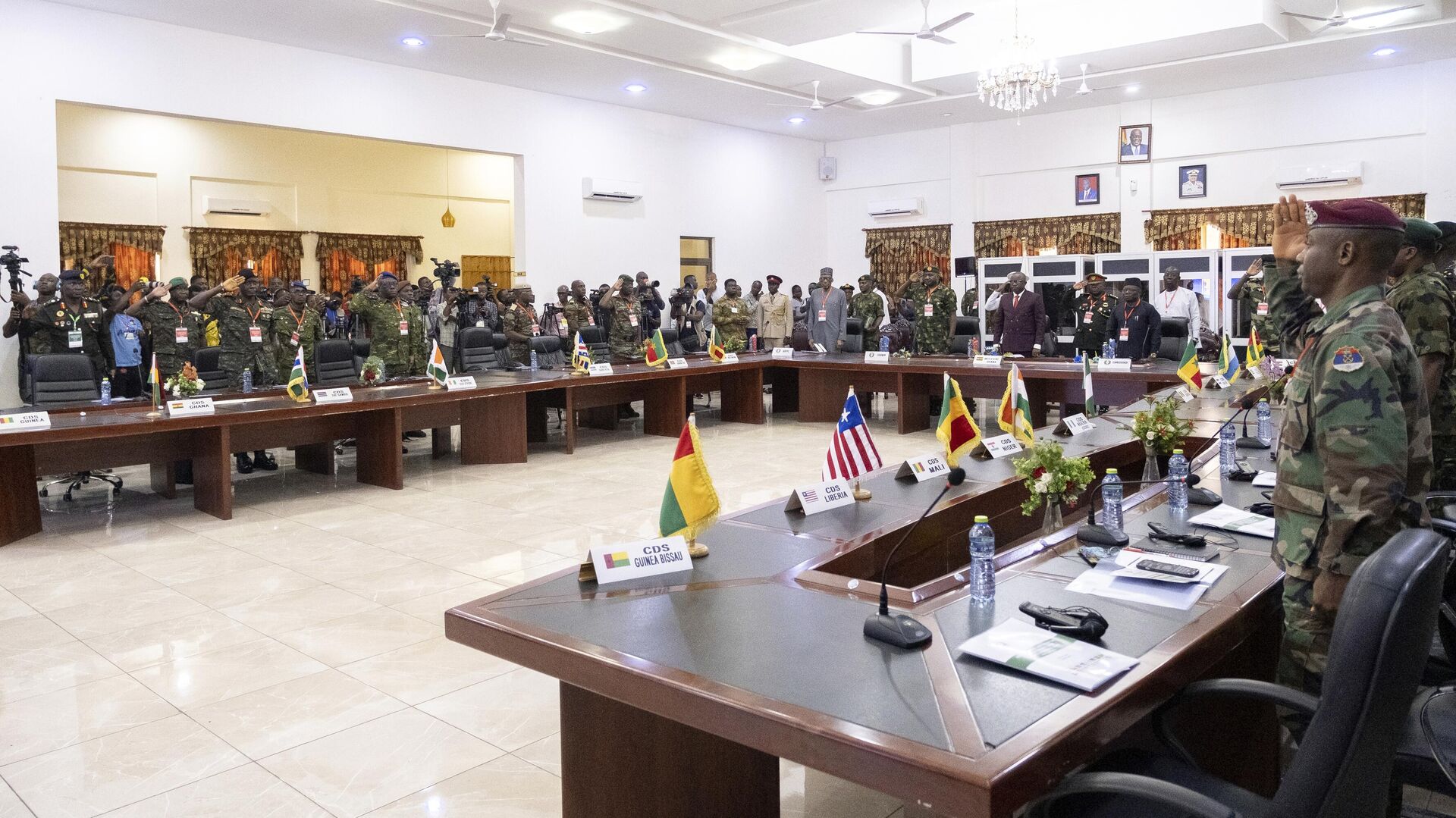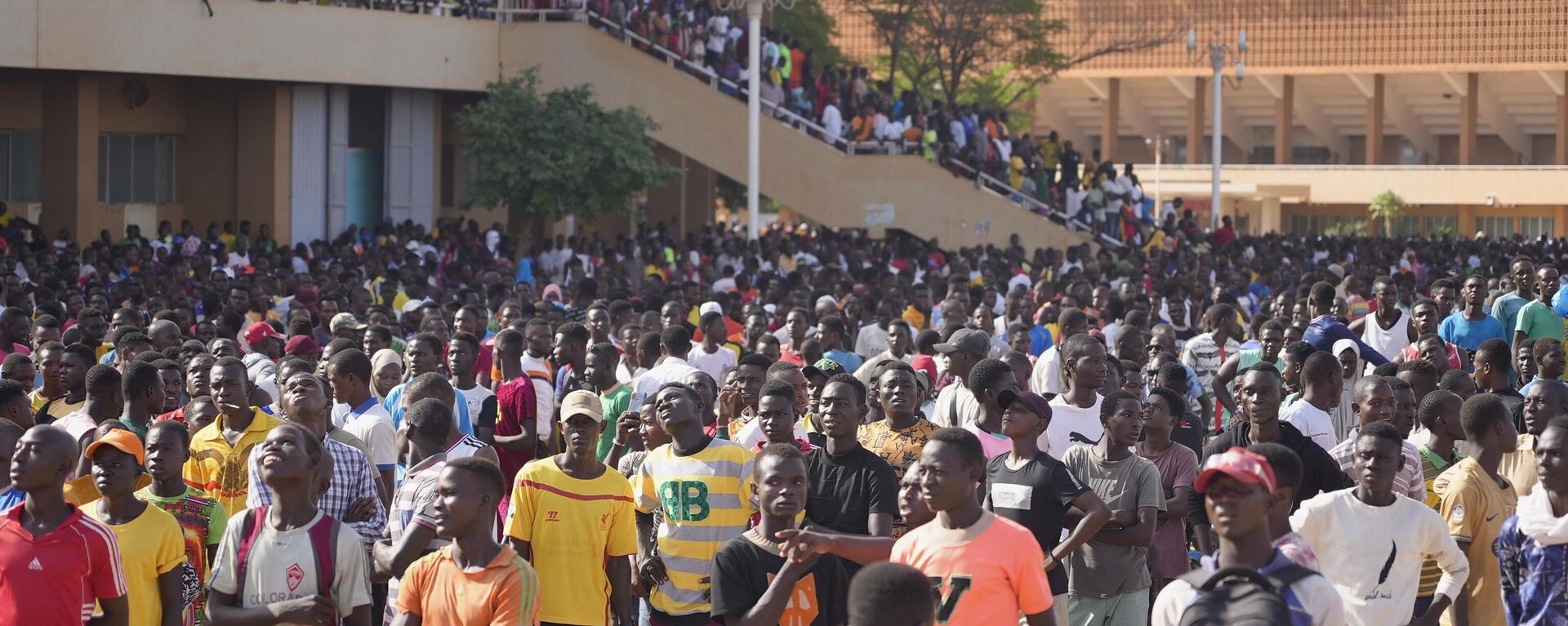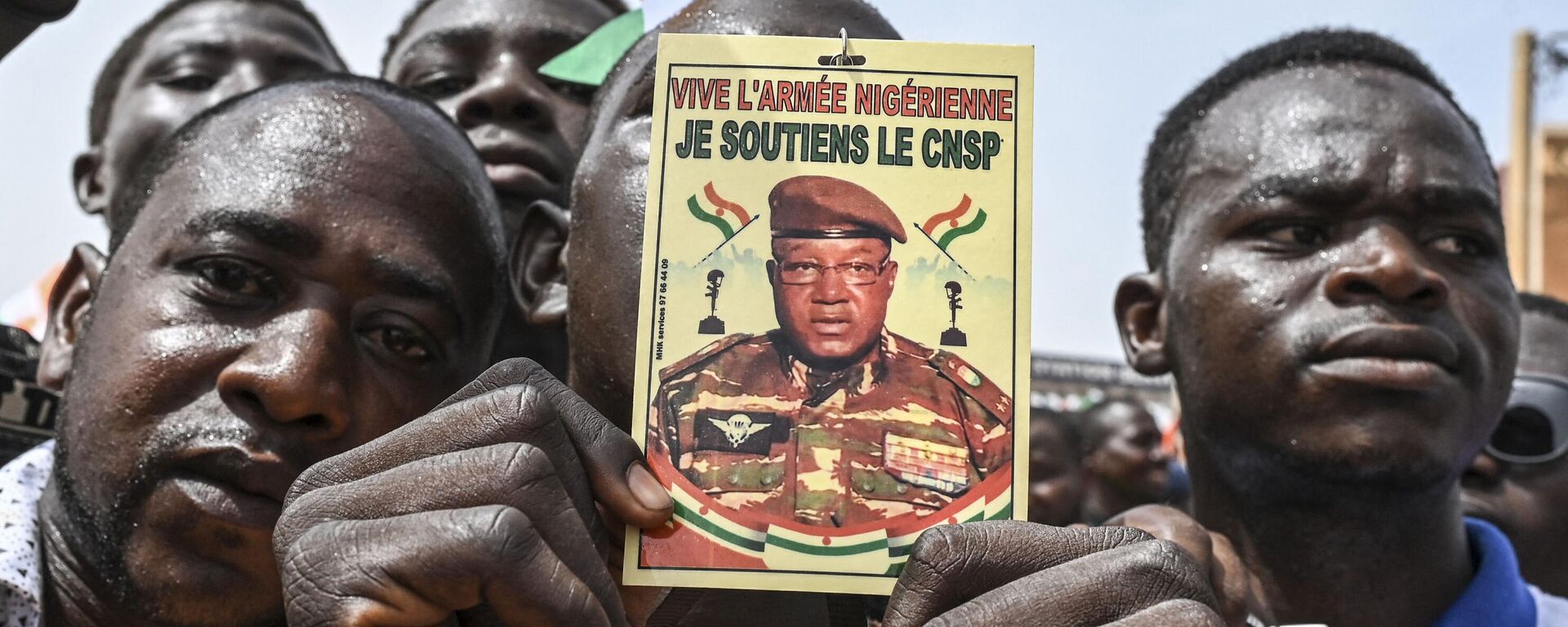https://en.sputniknews.africa/20230903/ecowas-military-intervention-can-weaken-niger-in-face-of-terrorism-analyst-says-1061829586.html
ECOWAS Military Intervention Can Weaken Niger in Face of Terrorism, Analyst Says
ECOWAS Military Intervention Can Weaken Niger in Face of Terrorism, Analyst Says
Sputnik Africa
In a military coup at the end of July, Nigerien President Mohamed Bazoum was ousted and detained by the head of his guard, Gen. Abdourahmane Tchiani. The... 03.09.2023, Sputnik Africa
2023-09-03T15:38+0200
2023-09-03T15:38+0200
2023-09-03T15:38+0200
situation in niger after military coup
mohamed bazoum
niger
russia
economic community of west african states (ecowas)
sputnik africa
european union (eu)
military
military coup
burkina faso
https://cdn1.img.sputniknews.africa/img/07e7/09/03/1061831171_0:24:3558:2025_1920x0_80_0_0_7198ce925fea92f5a6a2584650c3e383.jpg
A possible military intervention by ECOWAS in Niger in response to the military coup in the country as well as sanctions against the state would lead to "relaxation in the context of the fight against terrorism", the executive director of the Center for Security and Strategic Studies in the Sahel Aly Tounkara told Sputnik Africa.Even if this use of force "is hardly realistic", the country would be impacted in this case by a partition of power, which would in turn trigger other negative processes, Tounkara noted on the occasion of the Russian day of solidarity in the fight against terrorism, celebrated on September 3.According to the specialist, the potential deployment of troops in Niger by ECOWAS would risk destabilizing the country's situation and increasing the flow of illegal migration.He added that, given the instability in the state, the military would focus only on how to consolidate this power instead of fighting against illegal armed groups.Elaborating on the impact of ECOWAS sanctions, he highlighted that they reduce the country's ability to manage emergencies, putting the fight against terrorism "in the background," adding that the punitive measures ensure the deterioration of the security situation in the state.Following the coup, the organization suspended all cooperation with Niger, halting all financial aid, froze the rebels' assets and imposed a ban on commercial flights to and from the country, as well as closed all bordersOn August 30, the European Union (EU) foreign policy chief Josep Borrell said that EU countries have launched the preparation of a special sanctions regime against the participants of the coup in Niger.In early August, the bloc decided at a summit in Nigeria's capital Abuja that it could deploy the bloc's standby forces to press Nigerian coup leaders to restore the nation's detained president, Mohamed Bazoum, to power. This was followed by the announcement of the Commissioner for Political Affairs Abdel-Fatau Musah on August 18 that the date of the military intervention, which is yet to be disclosed, has been settled.Consolidation Between People and PowerAs for the Nigeriens' attitude to the military coup and the punitive measures imposed on the country, hundreds of local citizens declared their support of the military leaders and condemned possible foreign interference and coup-related sanctions, participating in numerous demonstrations.Commenting on the influence of the sanctions, particularly on the public sentiment, Tounkara stressed that they would be perceived as unfair, only "strengthening the military among the populations," and would set it up against ECOWAS and EU.In late July, a large demonstration in front of the French Embassy in the capital of Niger, Niamey, called for the closure of the foreign military bases and declared its support for the coup leaders, reports say.Moreover, the specialist pointed out that the imposed restrictions could over time facilitate Niger's development, triggering it to reflect on how "to independently manage its resources and expand its partnerships," "to rely only on itself."Burkina Faso, Mali, Niger RapprochementAlong with Niger, two other West African states, Burkina Faso and Mali, are governed by the military leaders. Burkina Faso's transitional president Captain Ibrahim Traore seized power in a September 2022 coup. Leader of Mali's interim government Assimi Goita came to power in a coup in May 2021.Tounkara noted that these three countries are united by the fact that "they got rid of the French power," and are all managed by the military. He also stated that in the near future, the three armies will consolidate their efforts to fight against Daesh*, which will bring "relief" for their citizens.Such cooperation could "inevitably lead to results that are quite encouraging in the fight against the terrorist nebula," the expert added.In early August, Mali's Minister of Territorial Administration and Decentralization Abdoulaye Maiga, who headed the delegations of Burkina Faso and Mali during their visit to Niger, revealed the countries' position towards possible ECOWAS intervention. According to the minister, the states will not tolerate any foreign interference and will "participate fully in self-defense operations" of the Nigerien forces in the event of an intervention.Russia's Role in Fight Against TerrorismContinuing the topic of combating jihadists in West Africa, Tounkara highlighted the importance of Russia's contribution to the struggle.He underscored that it is possible to see "observable progress" on this issue, recalling "the headquarters of the terrorists destroyed in the center of Mali thanks to Russian support" ensured by the supply of weapons or by "the human support granted to the Malian army".Furthermore, the specialist underlined that previously, the army could not access many localities "for reasons related to insufficient equipment". However, according to Tounkara the situation has significantly changed and, today, "the elements of the army manage to [go] there."Speaking about Russian efforts in a bid for security in Sahel region, it's worth noting that, on Thursday, a Russian delegation led by Russian Deputy Defense Minister Yunus-Bek Evkurov met with Burkina Faso's and Mali's leaders to discuss the state and prospects of their military-technical cooperation.*Daesh (also known as ISIL/ ISIS/ IS) is a terrorist groups banned in Russia and many other countries
https://en.sputniknews.africa/20230902/international-sanctions-motivate-nigerien-people-to-wake-up-researcher--1061805438.html
https://en.sputniknews.africa/20230902/1061816876.html
niger
russia
burkina faso
mali
west africa
Sputnik Africa
feedback@sputniknews.com
+74956456601
MIA „Rossiya Segodnya“
2023
Rasina Musallimova
https://cdn1.img.sputniknews.africa/img/07e7/0a/17/1063019139_0:0:646:646_100x100_80_0_0_348c74b69cf86748a53875f8148a2f85.jpg
Rasina Musallimova
https://cdn1.img.sputniknews.africa/img/07e7/0a/17/1063019139_0:0:646:646_100x100_80_0_0_348c74b69cf86748a53875f8148a2f85.jpg
News
en_EN
Sputnik Africa
feedback@sputniknews.com
+74956456601
MIA „Rossiya Segodnya“
Sputnik Africa
feedback@sputniknews.com
+74956456601
MIA „Rossiya Segodnya“
Rasina Musallimova
https://cdn1.img.sputniknews.africa/img/07e7/0a/17/1063019139_0:0:646:646_100x100_80_0_0_348c74b69cf86748a53875f8148a2f85.jpg
mohamed bazoum, niger, russia, economic community of west african states (ecowas), sputnik africa, european union (eu), military, military coup, burkina faso, mali, west africa, ibrahim traore, josep borrell, assimi goita, terrorist attack, terrorists, terrorism, fighting terrorism
mohamed bazoum, niger, russia, economic community of west african states (ecowas), sputnik africa, european union (eu), military, military coup, burkina faso, mali, west africa, ibrahim traore, josep borrell, assimi goita, terrorist attack, terrorists, terrorism, fighting terrorism
ECOWAS Military Intervention Can Weaken Niger in Face of Terrorism, Analyst Says
In a military coup at the end of July, Nigerien President Mohamed Bazoum was ousted and detained by the head of his guard, Gen. Abdourahmane Tchiani. The Economic Community of West African States (ECOWAS) condemned the coup, imposed a range of punitive measures against Niger, and considered the possibility of military intervention in the country.
A possible military intervention by ECOWAS in Niger in response to the military coup in the country as well as sanctions against the state would lead to "relaxation in the context of the fight against terrorism", the executive director of the Center for Security and Strategic Studies in the Sahel Aly Tounkara told Sputnik Africa.
"First of all, the war is very expensive, because the country's assets are frozen by the central bank, when the various development supports are suspended, naturally, the little money that circulates will only consist of paying the salaries of civil servants and running the state at a minimum. So imperatively, inevitably, there will be a relaxation in the context of the fight against terrorism," the expert said.
Even if this use of force "is hardly realistic", the country would be impacted in this case by a partition of power, which would in turn trigger other negative processes, Tounkara noted on the occasion of the Russian day of solidarity in the fight against terrorism, celebrated on September 3.
According to the specialist, the potential deployment of troops in Niger by ECOWAS would risk destabilizing the country's situation and increasing the flow of illegal migration.
"Many migrants will head to Niger because there will be no state. We are going to witness a country without a state, because each part of the government will strive to embody the state without any legitimacy," Tounkara underlined.
He added that, given the instability in the state, the military would focus only on how to consolidate this power instead of fighting against illegal armed groups.
Elaborating on the impact of ECOWAS sanctions, he highlighted that they reduce the country's ability to manage emergencies, putting the fight against terrorism "in the background," adding that the punitive measures ensure the deterioration of the security situation in the state.
"Clearly, the sanctions are a guarantee of aggravation of the security situation or insecurity in the country," he emphasized.
Following the coup, the organization suspended all cooperation with Niger, halting all financial aid, froze the rebels' assets and imposed a ban on commercial flights to and from the country, as well as closed all borders
On August 30, the European Union (EU) foreign policy chief Josep Borrell said that
EU countries have launched the preparation of a special sanctions regime against the participants of the coup in Niger.
In early August, the bloc decided at a summit in Nigeria's capital Abuja that it could deploy the bloc's standby forces to press Nigerian coup leaders to restore the nation's detained president, Mohamed Bazoum, to power.
This was followed by the announcement of the Commissioner for Political Affairs Abdel-Fatau Musah on August 18 that the date of the military intervention, which is yet to be disclosed, has been settled.
Consolidation Between People and Power
As for the Nigeriens' attitude to the military coup and the punitive measures imposed on the country, hundreds of local citizens declared their support of the military leaders and condemned possible foreign interference and coup-related sanctions, participating in numerous demonstrations.
Commenting on the influence of the sanctions, particularly on the public sentiment, Tounkara stressed that they would be perceived as unfair, only "strengthening the military among the populations," and would set it up against ECOWAS and EU.
"Most importantly, the sanctions have never allowed a military government to give up governance because, behind the sanctions, the desired effects are difficult to achieve, these ECOWAS sanctions or even those that will be imposed by the European Union will only make the military adhere to power and will only push the people to see ECOWAS, to see the European Union as their enemy number 1," the specialist explained.
In late July, a
large demonstration in front of the French Embassy in the capital of Niger, Niamey, called for the closure of the foreign military bases and declared its support for the coup leaders, reports say.
Moreover, the specialist pointed out that the imposed restrictions could over time facilitate Niger's development, triggering it to reflect on how "to independently manage its resources and expand its partnerships," "to rely only on itself."
"The military will come out winners," he concluded.
Burkina Faso, Mali, Niger Rapprochement
Along with Niger, two other West African states, Burkina Faso and Mali, are governed by the military leaders. Burkina Faso's transitional president Captain Ibrahim Traore seized power in a September 2022 coup. Leader of Mali's interim government Assimi Goita came to power in a coup in May 2021.
Tounkara noted that these three countries are united by the fact that "they got rid of the French power," and are all managed by the military. He also stated that in the near future, the three armies will consolidate their efforts to fight against Daesh*, which will bring "relief" for their citizens.
"The military cooperation so much desired by these countries will be further strengthened because there are military personnel at the head of these three states. There is less interference, especially from the powers, for the three states to get together. This will be a start of relief for the populations who live in the three borders," he said.
Such cooperation could "inevitably lead to results that are quite encouraging in the
fight against the terrorist nebula," the expert added.
In early August, Mali's Minister of Territorial Administration and Decentralization Abdoulaye Maiga, who headed the delegations of Burkina Faso and Mali during their visit to Niger,
revealed the countries' position towards possible ECOWAS intervention. According to the minister, the states will not tolerate any foreign interference and will "participate fully in self-defense operations" of the Nigerien forces in the event of an intervention.
Russia's Role in Fight Against Terrorism
Continuing the topic of combating jihadists in West Africa, Tounkara highlighted the importance of Russia's contribution to the struggle.
He underscored that it is possible to see "observable progress" on this issue, recalling "the headquarters of the terrorists destroyed in the center of Mali thanks to Russian support" ensured by the supply of weapons or by "the human support granted to the Malian army".
Furthermore, the specialist underlined that previously, the army could not access many localities "for reasons related to insufficient equipment". However, according to Tounkara the situation has significantly changed and, today, "the elements of the army manage to [go] there."
"[These observations] suggest that Russian support, as part of the fight against terrorism, is having convincing results," the expert concluded.
Speaking about Russian efforts in a bid for security in Sahel region, it's worth noting that, on Thursday, a Russian delegation led by Russian Deputy Defense Minister Yunus-Bek Evkurov met with Burkina Faso's and Mali's leaders to discuss the state and prospects of
their military-technical cooperation.
*Daesh (also known as ISIL/ ISIS/ IS) is a terrorist groups banned in Russia and many other countries




